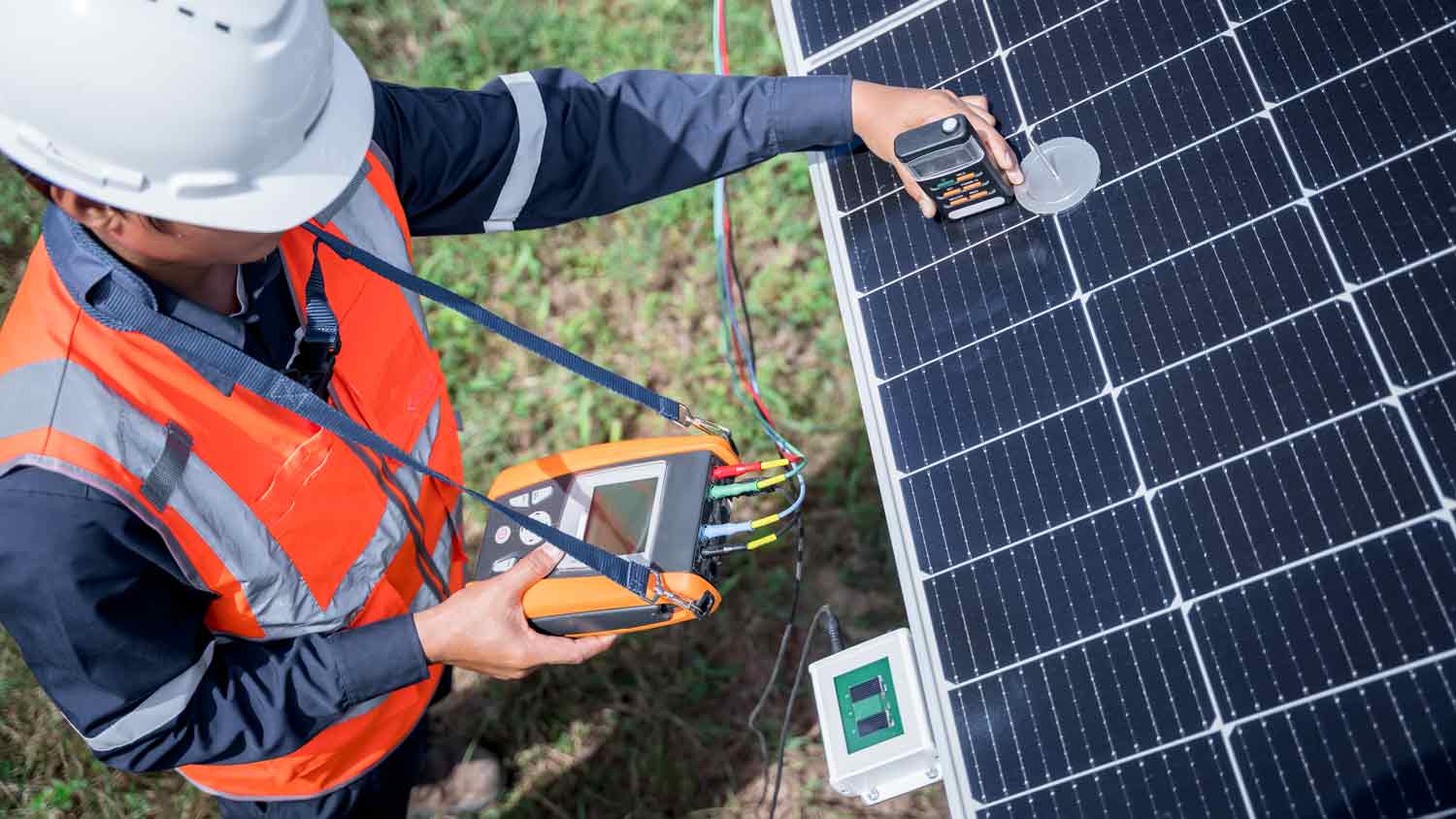
Discover the average solar panel inspection cost, what impacts pricing, and how to save. Get expert tips to keep your solar system efficient and safe.
Be prepared for an emergency one way or another


Solar batteries run off of power collected by solar panels and can power your home in case of a blackout.
Generators run off of fuel and can be standalone or connected to a home’s electrical system.
Solar batteries come with higher upfront costs and don’t require maintenance.
Generators require continued maintenance and come with fuel costs, but they are less expensive upfront.
Having a backup power source can give you peace of mind knowing that you’re able to heat or cool your home and keep your appliances running in case of a power outage. There are two main sources of backup power to choose from: solar batteries and generators. Choosing the best backup power solution for your home depends on factors like sustainability, upfront and continual costs, and how it will tie into your home. We broke down solar batteries versus generators to help you make the right decision.
Solar batteries are powered by the sun, while generators are gas-powered. These two types of backup power solutions also have very different upfront costs. A solar panel plus battery storage system can cost between $10,000 and $40,000 to purchase and install. If you already have solar and just need to add the battery backup, costs will fall on the lower end of this range (maybe even less when you factor in tax credits). Standalone generators can cost between $1,500 and $6,000 and can power appliances if the power goes out. A whole home standby system can cost between $4,500 and $8,000.

Solar batteries are powered by solar panels and connected to your home’s electrical system to provide electricity if the power goes out. You can also use them to power your home or certain appliances if your electric company has time-of-use (TOU) rates where electric rates are lower at certain times of the day than others. If you switch to battery power during higher rate times, you can save on your electric bills.
| Pros | Cons |
|---|---|
| Sustainable and eco-friendly | High upfront costs |
| Quiet | Should be installed by an electrician |
| Lower lifetime costs | Need multiple batteries to power the entire home |
| Tax incentives |
Best for:
Homeowners who can afford the upfront cost
Homes with existing solar panel systems
Homeowners who want to take advantage of lower TOU rates
Solar batteries are an eco-friendly method of backup power in the event that your electrical service is disrupted. They can provide peace of mind knowing that they’re ready to spring into action when you need to heat your home or keep your refrigerator running without power. Another major advantage of solar batteries is that they’re quiet, so you likely won’t notice them running.
Unlike generators that require fuel to run, solar batteries don’t have any ongoing costs after installation. So while the upfront cost is higher than a generator, you’ll likely spend less on solar batteries over the course of their life because you won’t be paying for fuel or maintenance costs. Regardless of the type of solar batteries you choose, they are an energy-efficient option, and you can take advantage of rebates and tax credits which can lower the final cost.
Solar batteries come with high upfront costs. If you’re installing solar panels and battery storage, the entire system can cost up to $40,000. If you just need to install battery storage to pair with existing solar panels, you can expect to pay much less. You’ll also need to hire an electrician qualified to install solar batteries.
A single solar battery typically can’t store enough electricity to power an entire home, so if your goal is whole-home power, you’ll need to determine how many solar batteries are needed to power your house.

Generators are gas powered machines that can be used to power your home or certain appliances if the electricity goes out. A generator can be connected to your home’s electrical system or used as a standalone, portable system. If the power goes out, you can plug appliances directly into a portable generator to keep them running for a shorter period of time.
| Pros | Cons |
|---|---|
| Less expensive upfront than solar batteries | Loud |
| Readily available | Run off fossil fuels |
| Can be installed by the homeowner in some cases | Come with ongoing maintenance costs |
Best for:
Homes on a tighter budget
Homes that need backup power for short periods of time
Homeowners without an existing solar panel system
Generators cost significantly less than solar battery options, and they can be used as a standalone system to power certain appliances if the power goes out. For instance, if you need to plug in your refrigerator to keep your food cold, you can plug it directly into the generator to keep it running. You can also purchase generators at a local home improvement store, making them easy to get if you’re on a shorter timeline.
A whole home generator, on the other hand, can connect directly to a propane tank or natural gas line or external tank which will power the generator if the electricity goes out. This means that you won’t have to purchase additional fuel or deal with refilling it when you’re using it.
Generators run on fossil fuels which brings up concerns about sustainability and fumes. They should be kept at least 20 feet away from the home when they’re running to prevent fumes from entering. Because generators run on gasoline or other fuel, if there is a case where fuel is short or you run out, you won't be able to use it.
Portable generators are loud. Whole house generators are much quieter, but they will still be noticeable in the silence of a power outage. Generators also come with ongoing maintenance costs that include changing the oil and checking the system to ensure everything is running properly.
When it’s time to make the decision between solar batteries versus generators, here are a few factors to consider.
Solar batteries typically have a sleek and modern look, so they don’t look too out of place when they’re installed on your home. Most portable generators have a clunky look and often feature a bold color, like red or blue, so they stand out like a sore thumb outside of your home. In some cases, it may be possible to conceal a generator in a utility cabinet.
This category is a tie because while solar batteries cost more upfront than generators, they don’t cost anything in order to run. Generators are a more affordable upfront option, but they come with maintenance and fuel costs to keep them running and ready for an emergency.
If you want to install a whole home generator, you’ll need to call in an electrician to make sure it’s done safely and correctly. But if you have a standalone generator and you just want to use it to power your refrigerator or another appliance in the event of a power outage, you can do that on your own by plugging the appliance directly into the generator. If you choose solar batteries, meanwhile, you’ll need to contact a solar panel installation professional near you to make sure they’re installed correctly.
Generators require regular servicing to keep them running properly. Solar panels also require maintenance to keep them clean and securely connected, but solar batteries work to store power for emergency use without the need for maintenance.
Generators run off of fossil fuels and give off carbon monoxide, so they aren’t the winner when it comes to eco-friendliness. Solar batteries receive their power from sunlight, a renewable (and free) resource, and if you already have either a stand alone solar panel system or a grid-tied system, this upgrade makes sense for extra power storage.
From average costs to expert advice, get all the answers you need to get your job done.

Discover the average solar panel inspection cost, what impacts pricing, and how to save. Get expert tips to keep your solar system efficient and safe.

Solar battery costs depend on the size of your system, labor, and capacity. Learn how much you could pay for batteries for home solar systems.

Get a detailed estimate of solar farm costs. Learn about average prices, key cost factors, and ways to save when planning your solar farm project.

Are there roof replacements that include solar? Get the facts here and learn whether you should replace your roofing before installing solar panels.

Many homeowners are looking to lower energy bills and also help the environment. Installing solar panels on a backyard shed can do both. Here's what to know.

Do solar panels damage roofs? We’re breaking down the different ways damage can occur post-installation and how to avoid issues.